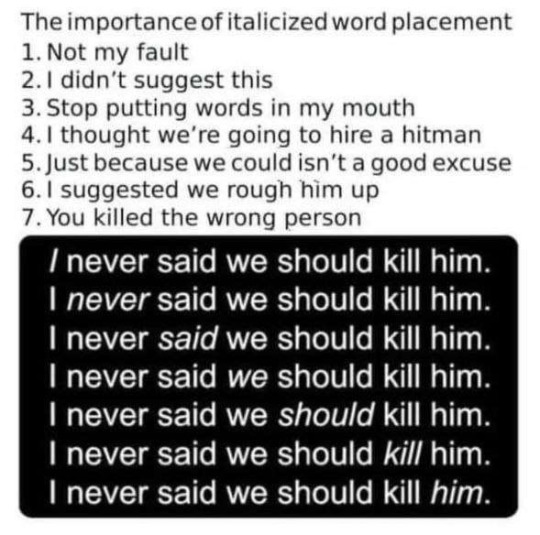An attempt to gather all remarkable writing posts.
Last active 2 hours ago
Don't wanna be here? Send us removal request.
Text
If you’re experiencing writers block, make a playlist with songs that remind you of your WIP and go on a 30 min walk.
Trust me.
3K notes
·
View notes
Text
Read this. Everything you need to know is in this essay.
5K notes
·
View notes
Text
Writing advice from my uni teachers:
If your dialog feels flat, rewrite the scene pretending the characters cannot at any cost say exactly what they mean. No one says “I’m mad” but they can say it in 100 other ways.
Wrote a chapter but you dislike it? Rewrite it again from memory. That way you’re only remembering the main parts and can fill in extra details. My teacher who was a playwright literally writes every single script twice because of this.
Don’t overuse metaphors, or they lose their potency. Limit yourself.
Before you write your novel, write a page of anything from your characters POV so you can get their voice right. Do this for every main character introduced.
231K notes
·
View notes
Text
Exposition 2: Naming New Characters
This post is brought to you by one of the worst line deliveries in the history of Supernatural: Sam’s reveal of Ruby 2.0 in “Lazarus Rising”. Also a companion post to not playing The Pronoun Game.
—
Introducing new characters to a scene and figuring out the precise moment to announce their name without sounding clunky can be very tricky. So let’s break it down into three scenarios:
Name is known by the narrator to be given in narration
Name is either known by the narrator, to be given in dialogue, or known by another character
Name is not known to anyone in the scene but the new character
Scenario 1: Name via narration
Personally I don’t have any problem whatsoever with: “This is character, they do X.” It’s quick, inoffensive, and doesn’t need to get convoluted and over complicated.
Now, if this is meant to be a reveal to the audience, you’ll have to play the Pronoun Game for a bit until you pull the trigger (so long as it is motivated and reflects back on the characters and isn’t just because the author is bad at suspense), but I’d recommend reworking the scene so your narrator discovers this information with the reader for the lowest risk of confusing your audience.
Generally I think if you introduce a new character into a scene via epithet, then in the next paragraph have the narrator use their name, I think the audience is smart enough to pick up on: “new entity has arrived on stage = unfamiliar name must belong to them” so you can even skip the exposition tag entirely.
The cook returned from the dining room, freshly traumatized by a wild Karen. Tyler took a breath, steadied themselves, and resumed their station.
Scenario 2: Name via other character, or dialogue
This is the aforementioned Supernatural blunder. There doesn’t appear to be a clip for this specific scene on YouTube so the moment in question:
Ruby: [Walks in through the back door] “Getting pretty slick there, Sam. Better all the time.” Sam: [Sighs, and contemplates all his life choices that led to this moment] “What the hell’s going on around here, Ruby?” [Pause for dramatic effect and damn-near looks into the camera]
Ruby’s “Sam” is delivered seamlessly and is flavored with some dry wit, in character for Ruby.
Sam, on the other hand, not only pauses before saying her name, but emphasizes her name in a completely unnatural way. I didn't do it justice here explaining how clunky this is, just trust me.
Nothing sounds or reads quite so juvenile like awkwardly tacking on a new character’s name to dialogue when no real person would talk like that. The line serves purely as exposition and it’s glaringly obvious and uncreative?
How to fix? As I said in my other exposition post: Make it motivated. Have the name reveal come with either inflection, tonality, or dual purpose so it’s not just exposition.
Meaning:
Have speaker be trying to get the person’s attention, and call their name
Have the speaker admonish the person, using their name
If this is a happy reunion, have the speaker excitedly exclaim the name
If this is a bad reunion, have the speaker mutter, growl, whisper, or grumble the name
If this is a surprise reunion, have them speak the name like a question
Have the speaker use a nickname the new character doesn’t like, prompting a correction to their real name
Have the speaker blank, prompting the new character to supply it, while offended that they forgot
Have the known character introduce the new character after a few exchanges that isolate the narrator, prompting an explanation a la “Sorry, this is X, they’ve been my friend for years.”
Scenario 3: Name via new character
Very similar to above with the same advice: Make it motivated and double as clueing us in on something either about the new character, or about the characters’ relationship with the scene, or how they see themselves, or how they expect this meeting to go.
If they’re bold, sassy, or snarky, they introduce themselves like they expect their audience to be impressed
Or, if they expect that name to already be known, and are surprised or irritated that they must introduce themselves
Straight up, have someone ask them who they are if they’re not supposed to be there
Or have someone ask them in a social faux pas, blurting out the question and then being embarrassed by doing so
Have the asker be rude, demanding an introduction where it might otherwise not be appropriate
Have them introduce themselves with uncertainty, if they’re shy or unsure about where they’re supposed to be
You get the idea? Whatever it be, make it be in character, and you’ll pull double-duty (as most exposition should) both naming your character and immediately establishing a relationship between your characters.
Scenario 4: When plot demands you must wait
Bonus! This happens when asking for a name would ruin the pacing and be wildly out of place in whatever’s happening (like mid-fight scene), or the narrator is unable to ask for plot reasons.
In which case, this still can pull double-duty by having your narrator come up with their own way of identifying the person: maybe they come up with a cute or insulting nickname, or a unique feature stands out that they’re jealous they don’t have, or there’s an identifiable piece of clothing or uniform to call them by their profession (works well for a group of distinct unknowns), or they’re acting in a suspicious fashion and can be labeled with a derogatory adjective.
At which point, narrator can either sleuth out their name themselves or it falls into one of the previous three scenarios.
Point being, once again, you are establishing a relationship between these two characters as soon as they’re on page together. Your exposition is pulling double-duty.
61 notes
·
View notes
Text
You Don't Need an Agent! Publishers That Accept Unsolicited Submissions
I see a few people sayin that you definitely need an agent to get published traditionally. Guess what? That's not remotely true. While an agent can be a very useful tool in finding and negotiating with publishers, going without is not as large of a hurdle as people might make it out to be!
Below is a list of some of the traditional publishers that offer reading periods for agent-less manuscripts. There might be more! Try looking for yourself - I promise it's not that scary!
Albert Whitman & Company: for picture books, middle-grade, and young adult fiction
Hydra (Part of Random House): for mainly LitRPG
Kensington Publishing: for a range of fiction and nonfiction
NCM Publishing: for all genres of fiction (YA included) and nonfiction
Pants of Fire Press: for middle-grade, YA, and adult fiction
Tin House Books: very limited submission period, but a good avenue for fiction, literary fiction, and poetry written by underrepresented communities
Quirk Fiction: offers odd-genre rep for represented and unagented authors. Unsolicited submissions inbox is closed at the moment but this is the page that'll update when it's open, and they produced some pretty big books so I'd keep an eye on this
Persea Books: for lit fiction, creative nonfiction, YA novels, and books focusing on contemporary issues
Baen: considered one of the best known publishers of sci-fi and fantasy. They don't need a history of publication.
Chicago Review Press: only accepting nonfiction at the moment, but maybe someone here writes nonfiction
Acre: for poetry, fiction and nonfiction. Special interest in underrepresented authors. Submission period just passed but for next year!
Coffeehouse Press: for lit fiction, nonfiction, poetry and translation. Reading period closed at time of posting, but keep an eye out
Ig: for queries on literary fiction and political/cultural nonfiction
Schaffner Press: for lit fiction, historical/crime fiction, or short fiction collections (cool)
Feminist Press: for international lit, hybrid memoirs, sci-fi and fantasy fiction especially from BIPOC, queer and trans voices
Evernight Publishing: for erotica. Royalties seem good and their response time is solid
Felony & Mayhem: for literary mystery fiction. Not currently looking for new work, but check back later
This is all what I could find in an hour. And it's not even everything, because I sifted out the expired links, the repeat genres (there are a lot of options for YA and children's authors), and I didn't even include a majority of smaller indie pubs where you can really do that weird shit.
A lot of them want you to query, but that's easy stuff once you figure it out. Lots of guides, and some even say how they want you to do it for them.
Not submitting to a Big 5 Trad Pub House does not make you any less of a writer. If you choose to work with any publishing house it can take a fair bit of weight off your shoulders in terms of design and distribution. You don't have to do it - I'm not - but if that's the way you want to go it's very, very, very possible.
Have a weirder manuscript that you don't think fits? Here's a list of 50 Indie Publishers looking for more experimental works to showcase and sell!
If Random House won't take your work - guess what? Maybe you're too cool for Random House.
680 notes
·
View notes
Text
“This is your daily, friendly reminder to use commas instead of periods during the dialogue of your story,” she said with a smile.
577K notes
·
View notes
Text
hey you're doing a great job, just remember: a semicolon can be used to combine two sentences where you might otherwise use a period; this allows you to create longer and longer run-on sentences
33K notes
·
View notes
Text
me: *writes fic*
me: great! time to post to ao3-
ao3 summary box: *exists*
me:
ao3 summary box:
me:
ao3 summary box:
me:
127K notes
·
View notes
Note
What is your opinion on the Oxford Comma? I've noticed you use it some of the time, but not always.
-Very curious fellow author
I use it when it increases clarity, don't bother when it doesn't matter.
5K notes
·
View notes
Photo

US climate with equivalent cities from around the world.
Keep reading
80K notes
·
View notes
Text
Rooms in a Lighthouse
Although the buildings of lighthouses differ depending on their location and purpose, they generally have common components. However, a distinction must also be made between a lighthouse station consisting of the lighthouse and all the outbuildings such as the lighthouse keeper's house, the fuel house, the boathouse and the building for fog signalling, i.e. a land station, and an inhabited lighthouse as it was found at sea.

Sections of Bell Rock and Skerryvore Lighthouses, date 1884
Skerryvore is a remote reef that lies off the west coast of Scotland, 12 miles (19 kilometres) south-west of the island of Tiree. Skerryvore is best known as the name given to the lighthouse on the skerry, built with some difficulty between 1838 and 1844 by Alan Stevenson.
The Bell Rock Lighthouse, off the coast of Angus, Scotland, is the world's oldest surviving sea-washed lighthouse. It was built between 1807 and 1810 by Robert Stevenson on the Bell Rock (also known as Inchcape) in the North Sea, 11 miles (18 km) east of the Firth of Tay. Standing 35 metres (115 ft) tall, its light is visible from 35 statute miles (56 km) inland.
If you are only dealing with an inhabited tower, you usually have the following rooms in it. Please note that, apart from the lantern room, there is no standardised scheme and the rooms were often arranged differently.
The lantern room is the glazed housing at the top of the lighthouse that contains the lamp and the lens. The glass panes are held in place by vertical or diagonal metal rungs. A lightning conductor and an earthing system, which are connected to the metal roof of the dome, ensure that any lightning strikes are safely discharged.


Sections of the Eddystone Lighthouse of 1759 and 1884
Immediately below the lantern room is usually a guard room where fuel and other supplies were stored and where the keeper prepared the lanterns for the night and often kept watch. The clockwork (for turning the lenses) was also located there. On a lighthouse there is often an open platform, the gallery, outside the watchroom (main gallery) or the lantern room (lantern gallery). It was mainly used to clean the outside of the lantern room windows. Below this was a living room, bedroom, possibly a separate kitchen, if not a cooking area was accommodated in the living room. In addition, there were often several storage rooms, an oil room (where the oil for the lantern were storaged) and a coal room. And if you're wondering where the bathroom was - well there wasn't one, there was a wash bowl, possibly a wooden tub for an occasional bath, but rarely, and chamber pots in the bedroom.
Life in a lighthouse at sea was not easy and managed to bring many an old sea dog to his knees. The lighthouse keepers on land had it much easier.
2K notes
·
View notes
Note
how do i ‘sigh’ contracts with agents and/or publishers if i live internationally? as writer from the literal other side of the world where the currency isn’t comfortable enough for me to simply get on multiple flights to the US/UK and back, how does any of the querying and publishing process happen with an international writer?
Working with Agents and Publishers Internationally
You don't have to be face-to-face with an agent or publisher in order to sign with them. Meetings are typically done over the phone, or more frequently nowadays, through a video call. Contracts can be sent through the mail and signed, but they can also be signed digitally.
It's not a requirement to meet your agent, publisher, or editor face-to-face. They won't fly you out, and they won't expect you to fly yourself out. In fact, most authors never actually meet their agents, publishers, or editors.
These days, querying is done digitally, meaning that you upload and/or e-mail relevant documents rather than mailing them physicall or handing them off in person. For that reason, querying agents or publishers in another country works the same as it does for people within that country. Research agents and find ones who represent what you write and have open submissions. Carefully read through submission guidelines and put together your querying packet. Then submit it either through the web site or via e-mail, depending on what they ask for. Due to the fact that everything can be done over the phone, e-mail, and video call, it's very common for agents and publishers to have clients all over the world.
I hope that gives you some reassurance!
•••••••••••••••••••••••••••••••••
I’ve been writing seriously for over 30 years and love to share what I’ve learned. Have a writing question? My inbox is always open!
LEARN MORE about WQA
SEE MY ask policies
VISIT MY Master List of Top Posts
COFFEE & FEEDBACK COMMISSIONS ko-fi.com/wqa
84 notes
·
View notes
Text
sacred romantic moments
“ don’t go. stay. “
“ but you’re here, so stay. “
“ i don’t want to be alone tonight. “
“ just come over. “
“ let’s be alone together. “
“ i didn’t know where else to go. “
“ i don’t want us to be apart anymore. ever. “
“ i wouldn’t have called you if it wasn’t important. “
“ you can talk to me about anything. you know that, right? “
“ just… be honest with me, do you hate me? “
“ i could never hate you. not really. “
“ you’re my friend, but… sometimes i wish you were more than that. “
“ we’re not just friends. you know that. “
“ i think i’m falling in love with you. “
“ can i hold your hand? “
“ yeah, you’re in love with me. “
“ just hold me. “
“ things would be so much easier if we were honest with each other. “
“ why can’t you be honest with me? with yourself? “
“ maybe you could stay? just for tonight? “
“ it’s dark outside, and it’s raining. my arms are much safer. “
“ you can’t keep doing this. you can’t keep lying to yourself. “
“ i can’t keep lying to myself, or to you. it’s not fair on either of us. “
“ i think you should kiss me. “
“ kiss me like you mean it. “
“ just kiss me. “
“ you shouldn’t kiss me right now. “
“ look me in the eyes and tell me you love me. “
“ you can’t lie to me, you know. “
“ you know me better than anyone. you always have. “
“ you’re pretty amazing. you know that, right? “
“ you’re just… you’re extraordinary. “
“ you’re good to me, you know. really good. “
“ you’ve made me the happiest i’ve ever been. “
“ i don’t know what i would have done if you weren’t here. “
“ our love can conquer anything. “
“ and for many generations to come, our love story will live on. “
“ i want you to marry me. “
“ if you asked me to marry you tomorrow, i’d say yes. “ “ what about today? “
“ marry me, name. marry me and make me the luckiest [x] in the world. “
“ your kiss could mend a broken heart. “
“ are you going to kiss me again, or do i have to do it myself? “
“ i could cry, that’s how much i love you. “
“ you’re worthy of my love. “
“ truth is that i’m so damn in love with you that i don’t know what to do with myself. “
“ maybe tonight, it’s you and me. “
“ i don’t know what the future holds. all i know is that i hope you’re in it. “
“ could you promise me one thing? “
“ promise me that we’ll be together, no matter what. “
“ it’s you and me, forever. no matter what. “
“ i didn’t want to tell you until i was sure, but… i’m pregnant. “
“ we’re going to be family! “
“ this baby, it’s the best thing that could ever have happened to us. “
“ i can’t believe this, we’re going to be parents! “
“ dance with me? “
“ may i have this dance? “
“ you’re my whole world, you know. “
“ don’t speak, just… kiss me. “
“ you have no idea how long i’ve been wanting to that. “
“ i’ve been wanting to tell you for so long… “
“ so… is this like, a thing now? “
“ i always miss you, even when you’re next to me. “
” i miss you. i miss you so much it hurts. ”
” i don’t want you to miss me. it’s tearing me apart. ”
“ you make me happier. “
“ i love waking up next to you. “
“ my favorite thing is falling asleep next to you. “
“ come cuddle with me. “
“ this is torture, isn’t it? “ “ not in the slightest. “
“ do you love me? “
“ could this be something more? “
“ move in with me. “
“ do you think we should move in together? you spend all your time here anyway. “
“ are you serious? i’ve had a crush on you for as long as i can remember. “
“ i know you’re in love with me. “
“ you’re really cute, you know. “
“ you’re so damn attractive. you know that right? “
“ if anybody were to kiss me, i would want that person to be you. “
“ and right now, i think you should kiss me. “
6K notes
·
View notes
Note
enemies to lovers where they really hate eachother but somehow their words have a tint of flirt in it and I'm struggling to find them🙏🙏
Flirty Threats
-> feel free to edit and adjust pronouns as you see fit.
"Are you laughing at me?" "Yeah, I am. What are you going to do about it?"
"Wipe that smile off your face before I do it for you."
"And you think you can get away with threatening me?"
"What made you think you can talk to me like that?"
"Are you still thinking about me? Is that why you're so unfocused?" "You wish."
"You really think you have that much of an impact in my life?"
"Do as I say."
"Oh, you think you're hot stuff?"
"Take a shower, [last name], I can smell you from here." "Care to join me?" "In your dreams."
"I don't think you realize how angry you make me." "Aw, I have that much of an effect on you?"
"Wow, Love. You've really outdone yourself this time."
"Trying out a new nickname, are we?"
6K notes
·
View notes
Text
How to Write Betrayal
Betrayal is a powerful plot element that is represented in countless stories. The gravity of betrayal brings a profound depth to character dynamics, plots, and themes alike, making it an indispensable tool for writers to explore emotions, conflicts, and the complexities of human nature. Let’s explore some quick tips on how to write betrayal!
Behaviour
Secretive actions
Dishonesty
Becoming emotionally distant
A sudden change in routine
Pushing people away
Nervous or fidgety movement
Frequent lying or making up stories
Unexpected aggression or irritability
Unjustified mood swings or emotional outbursts
Increasingly defensive
Interactions
Disturbed interpersonal relationships
Frequent misunderstandings or fights
Withholding information
Avoiding personal discussions
Insincerity in conversations
Frequently cancelling or missing plans
A sudden shift in relationship dynamics
Quick to deflect or place blame
Frequent subject changes
Gradual emotional detachment
Body Language
Avoiding direct eye contact
Defensive stance and crossed arms
Covering mouth or touching face
Shuffling or restless movements
Forcing smiles or laughter
Constantly looking around or at the ground
Stiff, tense posture
Heavy breathing or frequent sighing
Avoiding touch or skin contact
Exaggerated gestures
Attitude
A lack of concern or empathy
Increasingly personal and hurtful arguments
Erratic or unpredictable reactions
Self-centeredness
Insincerity
Dismissive or negative attitude
Callous disregard for other's feelings
A negative or pessimistic outlook
Inability to handle criticism
Withdrawal from relationships
Positive Story Outcomes
In the wake of a betrayal, a story can manifest various positive outcomes that add depth to the plot and its characters. Relationships can be strengthened, showing their resilience. Characters may discover newfound self-reliance and learn valuable lessons about trust and forgiveness, leading to an increase in empathy and understanding, personal growth, and the reinforcement of personal values. These experiences can encourage a clearer understanding of personal boundaries, prompt self-reflection, introspection, and the development of healthier coping mechanisms. Ultimately, these positive outcomes can bring about improved communication and honesty, forming the silver lining in the cloud of betrayal.
Negative Story Outcomes
The aftershocks of betrayal can reverberate throughout your story. This might include an irreparable fracture of trust and damage to relationships. Betrayal can trigger psychological trauma, leading to an increase in suspicion and insecurity. Feelings of inadequacy or self-blame may surface, and characters can experience a heightened sense of isolation. The fear of forming new relationships or trusting others can become overwhelming. There may also be an escalation of conflict or violence and the reinforcement of negative behaviours or patterns. Damaged self-esteem or self-worth may be another repercussion, and this can encourage destructive coping mechanisms.
Helpful Synonyms
Treachery
Deception
Double-crossing
Duplicity
Backstabbing
Two-faced
Disloyalty
Unfaithfulness
Infidelity
Falseness
Perfidy
Treason
Fraud
Deceit
Slander
Misrepresentation
Falsification
Chicanery
Double-dealing
6K notes
·
View notes
Text
write for yourself. put your fantasies on paper. no one knows what you are writing. no one knows what's in your head. no one is going to write it for you. if you don't write down your ideas they will disappear. if you are too scared to write your thoughts then don't write, try something different. if writing is the only way, get to writing. no one else's opinion matters. no one else's opinion will ever matter
18K notes
·
View notes
